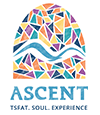Ascent was started in 1984 by three couples – myself and my wife Chaya Bracha, Yerachmiel and Shulamit Tilles, and Moshe and Yehudis Wisnefsky. Moshe and Yehudis left after the first year to start a new life and shlichut (outreach work) in Jerusalem. Yerachmiel and I continued, but our real partners were our wives, who participated in all the activities and decisions.
About ten years after we began I faced a quandary. Tsfat had absorbed an astounding number of Russian immigrants and Ascent had jumped right in, teaching hundreds of people about basic Judaism. After the initial wave of classes, we also started a daily learning program for the older adults who were not working. They were often the patriarchs of the family. An additional advantage was that Ascent had daily activities that an outside visitor could come and see as we were beginning to grow larger also with Hebrew and English speakers. While a small fraction of the funding came from the Ministry of Religion on the condition that they were on premises for four hours a day, I had to raise most of the funds from donors overseas and it was not easy. I was always on the verge of closing the program down.
It was true that these retired gentlemen put on tefillin and prayed together each day, had breakfast and said birkat hamazon (Grace after Meals) together, then they had an hour of classes. But the last two hours they played board games! Was it worth all the efforts of fundraising when half the time was spent on board games? Outwardly, they did not seem to be changing Jewishly very much. There was always a suspicion that they only came for the stipend. Their teacher explained that after a lifetime of secular lifestyle it was hard for them to sit any longer. But the truth is, it bothered me and I shared my concern with Chaya Bracha, sometimes daily.
Many of the women in our Chassidic community would take turns going to different local neighborhoods for home visits, especially to women who had just given birth, to see if they needed physical help or Jewish encouragement. Chaya Bracha was no exception. Her home visit partner was Chani Maidovnick and they would drive to some of the outlying neighborhoods every week and go door to door. One day they were about to knock on a door and they saw the house had a big mezuzah. “That is strange”, Chana said, “This is not a religions neighborhood, why would they have a big mezuzah?” But they knocked anyway. And a woman in shorts came to the door, saw these two observant women and said, “Oh, please wait a moment”, and went and came back in a skirt and with some special kosher cookies and invited us to sit down. Now we were really surprised and asked her how she knew about tzniut (the laws of modesty) and kashrut and about mezuzah?
She laughed and explained. The whole time she was growing up in Russia they had to live in a tiny room, sharing a kitchen and a bathroom with four other non-Jewish families. It was impossible to keep any kind of kashrut, have a mezuzah or do anything Jewish at all. It had always made her father crazy and he said over and over again, if they ever were able to get out of Russia they would live fully as Jews. Now that the gates had opened and they were here in Tsfat, he proudly went every day to study and made sure that the entire family kept whatever they could. She said, to be honest, it was not just her father. She, her husband, her sister, and her husband also felt that when there had been such a miracle that G-d brought them to Israel, they should keep the commandments and she appreciated what her father taught them. “Where did he go to study?” Chaya Bracha asked, already suspecting the answer. “Ascent” she answered.
Chaya Bracha came home and called a staff meeting. From heaven came the answer about whether or not to continue the Russian learning program. Of course we must! Our program also changed the lives of two other families. And since then who knows how many others…
[This Russian kollel (Jewish men’s study center) has continued for the past 25 years under the dedicated care of Rabbi David Notik. For the past four years, Elena Kupchik has organized twice-weekly classes, Jewish activities and Shabbatons at Ascent for a dedicated group of Russians. Even through COVID lock-down, masks, and social distancing, the students refused to miss a class!]
